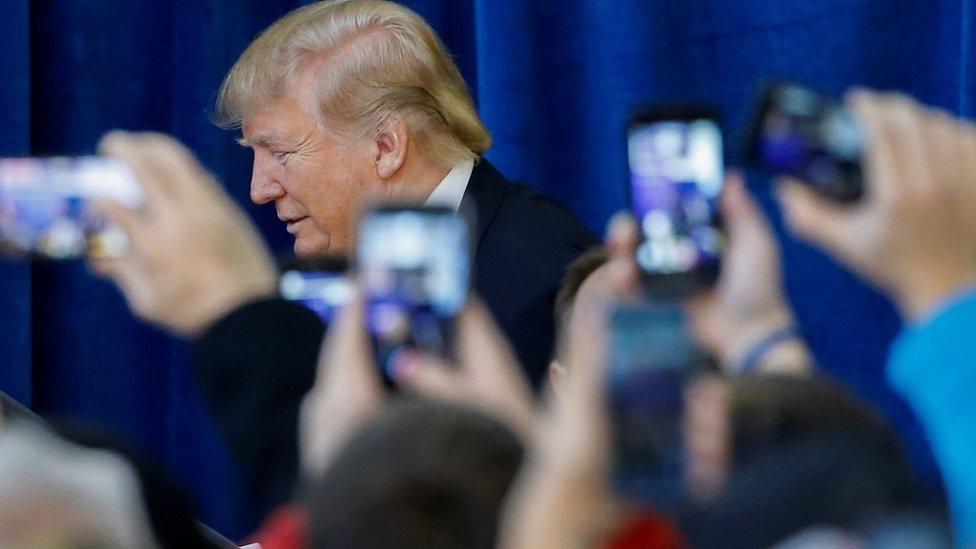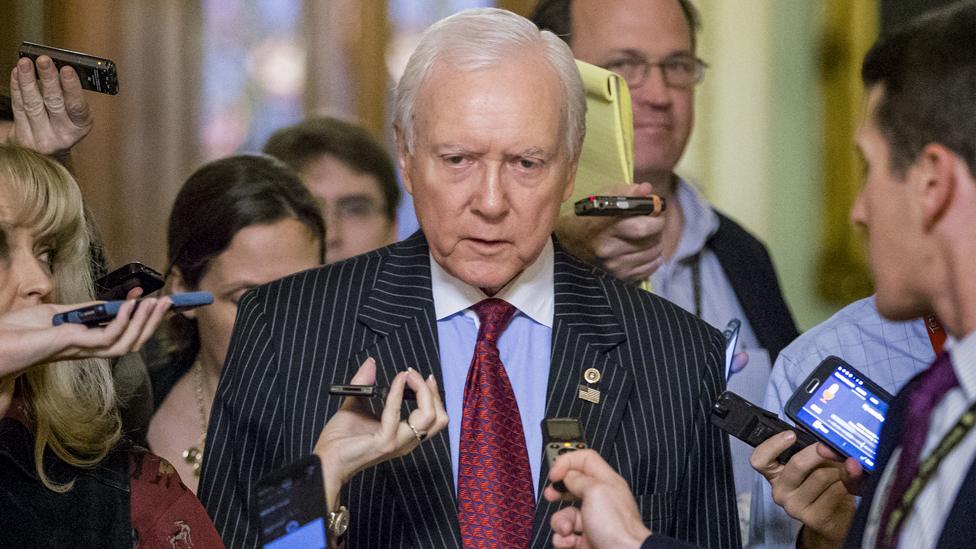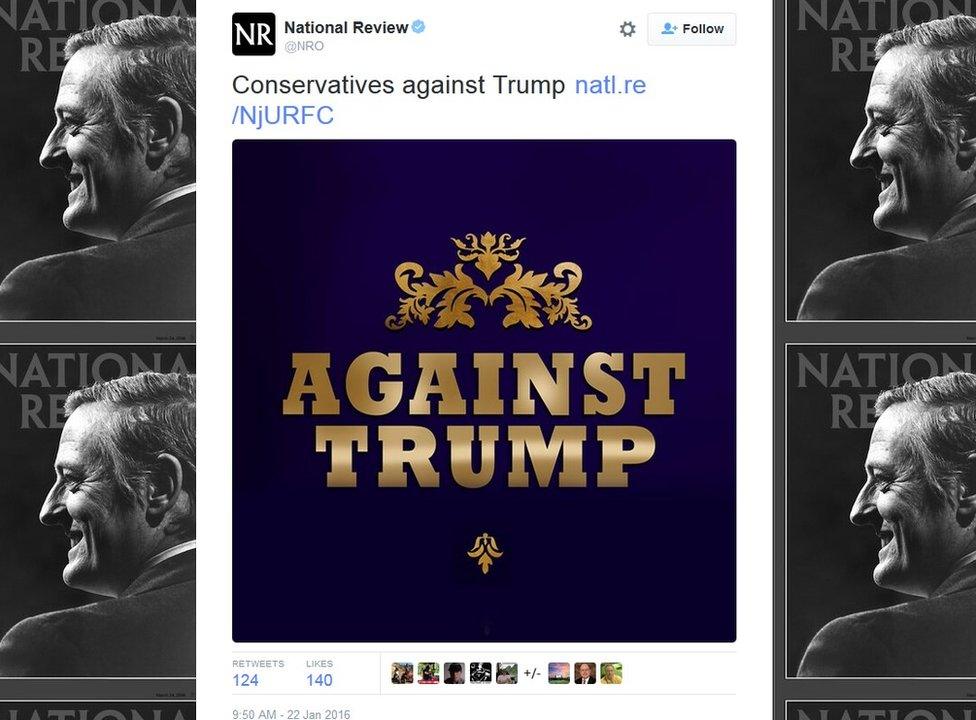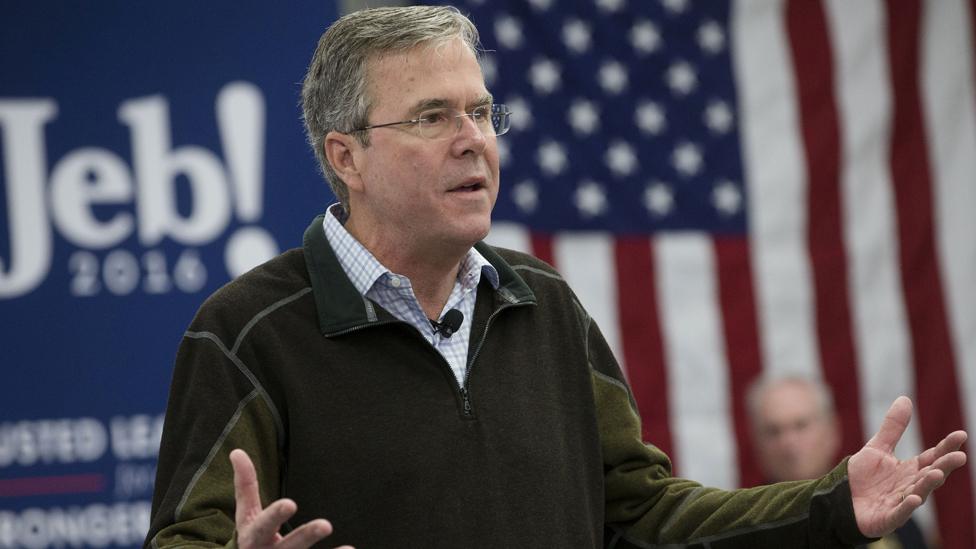Is Donald Trump causing a Republican civil war?
- Published
- comments

Republicans are split on how to deal with Donald Trump
Donald Trump's persistent lead in opinion polls is creating a growing divide within the ranks of the Republican Party that threatens to turn into civil war.
In just the past few days conservatives seem to be splitting into two camps - those who view Mr Trump as an existential threat to their ideological movement and others who seek to shape his views and harness the wave of support he has generated into greater political power.
Among this latter group are a number of veteran Republican politicians who consider the candidate closest to Mr Trump in the battle for the nomination, Texas Senator Ted Cruz, a less appealing option as the standard-bearer for their party.
Counted in their ranks are party elder statesman like 1996 Republican presidential nominee Bob Dole, external, former Senate majority leader Trent Lott, external and former Mayor of New York City Rudy Giuliani, as well as current officeholders such as Congressman Peter King of New York and Senator Orrin Hatch of Utah, whose position as president pro tempore of the Senate puts him third in line to the US presidency.
They say Mr Cruz is a rigid ideologue who has undermined Republican strategy during his three years in the Senate, while Mr Trump - no doubt a political wild card - could become a palatable candidate with whom their party could work.
"There's a lot of people who don't feel [Mr Cruz] can appeal to people across the board," Mr Hatch said during a television interview.

Mr Hatch said he's not so sure Donald Trump would lose a general election
"I've come around a little bit on Trump," he continued. "I'm not so sure we'd lose if he's our nominee because he's appealing to people who a lot of the Republican candidates have not appealed to in the past."
Other Republican insiders share the view that a Republican presidential ticket led by Mr Trump isn't the non-starter it was once thought to be.
"It's our job to nurture the candidates, to bring them into the fold, including Trump," Arthur Laffer, a prominent conservative economist best known for advising President Ronald Reagan to adopt supply-side economic policies, said to the Washington Post, external.
Republican lobbyist Charles Black told the New York Times Mr Trump can be "coached", external and would eventually seek advice from a Washington establishment that he has scorned up to this point.
"If he got nominated he'd be scared to death," Black said. "That's the point he would call people in the party and say, 'I just want to talk to you.'"
That's a position that's far from universally shared on the right, however. While some Republicans appear to be making peace with Mr Trump as their party's nominee, others are girding for all-out war.
The National Review, which styles itself as the gatekeepers of conservative orthodoxy since its founding by William F Buckley in the 1955, has published a special issue titled "Against Trump", external, featuring essays by nearly two dozen columnists, commentators, historians and activists.
"Trump is a philosophically unmoored political opportunist who would trash the broad conservative ideological consensus within the GOP in favour of a free-floating populism with strong-man overtones," the magazine editors write, external.

"Trump can try to make his blankness a virtue by calling it a kind of innocence," they conclude. "But he is like a man with no credit history applying for a mortgage - or, in this case, applying to manage a $3.8tn budget and the most fearsome military on earth."
William Kristol, editor of the conservative Weekly Standard magazine, issued his own rebuke, external, calling Mr Trump a "con man" in the mould of a Latin American-style dictator who embraces nationalism and populism over conservative principles.
"Are today's conservatives supposed to appease and make their peace with such politics?" he asks. "Is the task of today's American conservatism to normalise Trump and Trumpism?"
The National Review's move has already come at a price. According to magazine publisher Jack Fowler, the Republican National Committee has informed him that the magazine will no longer be allowed to serve as a co-moderator of the 25 February Republican presidential debate in Houston, Texas.
Meanwhile, a former aide to 2012 Republican presidential nominee Mitt Romney has started a political-action committee devoted to taking down Mr Trump. It has reportedly spent $45,000 (£31,000) on anti-Trump direct mail in Iowa so far.
But will such broadsides reshape the Republican presidential race where previous attacks on the New York billionaire have failed to make a dent?

Jeb Bush is attacking both Donald Trump and Marco Rubio
Former Florida Governor Jeb Bush, who has become the most outspoken critic of the New Yorker among those running for the Republican nomination, heralded the move.
"Welcome to the fight, all," he tweeted, external, linking to the National Review's anti-Trump issue. "Trump is not a conservative."
Mr Bush appears to be pursuing a calculated political manoeuvre, however. While he attacks Mr Trump on the campaign trail, his affiliated groups have spent much more time - and money - targeting candidates like Florida Senator Marco Rubio and Ohio Governor John Kasich, who - like him - are directly appealing to more traditional "establishment" Republican voters.
The goal, according to sources within the Bush operation cited by Politico Magazine, is to take down Mr Bush's direct rivals and turn the race into a "binary choice" between Mr Trump and Mr Bush.
Such a strategy is a dangerous game, of course.
And if the Republicans who are currently offering tepid support for Mr Trump while bashing Mr Cruz are attempting a similar gambit - they could be in for a very rude awakening.
What happens if Mr Trump ends up their party's nominee and, instead of making nice with those who once attempted to thwart his rise, he continues blazing his own path - right through the Republican Party?